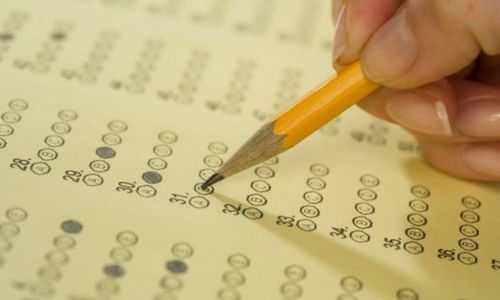Answers For Exam techniques
Answers and detail explain for Exam techniques
Explain
Exam techniques

Listening 4:
Tutor: Morning, everyone. I thought we’d get together today and just talk about exam techniques. I’m sure everyone has different ideas about them. So shall we find out what you do first when you get into an exam?
Gerry: 1Check that you have the right exam paper?
Tutor: 1It sounds funny, but students do actually answer the wrong exam paper sometimes! So, check that it’s your exam, first. Then what?
Gerry: Write your examination number on the answer sheet? Tutor: 2Well, it might sound obvious, but writing your examination number at the beginning of the exam can be a good idea. Apart from making sure the examiner knows who wrote the exam, can anyone say why?
Mac: It can help you relax.
Tutor: Yes, that’s right. Doing something easy like that gives you a chance to calm down. Right, so what do you do next?
Barbara: Read the questions carefully?
Tutor: 3Well, before you read the questions, what should you do?
Mac: 3Read the instructions.
Tutor: Yes. You should read the instructions next. You need to know how many questions you have to answer, and whether you have to answer all the questions, or only some. What other important information do you need to check before you start?
Gerry: How much time you have?
Tutor: Yes, Gerry’s right. 4You need to make sure that you know how long the exam is, so you can manage your time properly.
Tutor: OK. What do you do next?
Barbara: Read the questions?
Tutor: Yes. 5It’s very important to read the questions. Not just once, but several times.
Mac: 6I usually make a few notes when I’m looking at the questions. Sometimes a question looks easy and then when you start writing you realize that it’s actually more difficult than you thought.
Gerry: Yeah, but you don’t want to spend too much time writing notes.
Tutor: No … but it’s a good idea to jot down a few ideas to see if you can remember the arguments for the topics you studied most.
Barbara: Once we’ve decided, is it better just to start at the beginning and answer the questions as they appear on the exam? Or should we start with the easy questions?
Gerry: Mmmm. 7Well, I start with the questions that I know better. And leave the ones I’m not sure of for the end.
Mac: 8That’s what I do, but I still keep an eye on the clock, especially, when the questions are all worth the same number of marks.
Tutor: Mac’s right. If you write one very good answer, but it’s only worth thirty per cent of the marks, you still lose the other seventy per cent on that exam.
Gerry: 9So, it’s better to write our main ideas for a question even if we don’t have time to answer it properly.
Tutor: Yes, absolutely. We can’t give you marks for writing nothing. But, if you give us your main ideas, we can give you some marks.
Barbara: Oh, really! I wish I’d known that in my last exam. I spent all my time writing a long answer to one of the questions and didn’t get round to the other two. 10I didn’t understand why I got such a low mark.
Mac: Yeah. That’s what happened to me. Luckily, my tutor explained it afterwards and I never did it again.
technique /tekˈniːk/ (n): kĩ thuật/ kĩ năng (để làm việc gì..) (We have developed a new technique that corrects the problem.)
the answer sheet Bảng trả lời câu hỏi (sheet là âm /i:/ dàiiiii, phát âm cẩn thận từ này nhé mọi người, rất dễ nhầm sang sh*t)
obvious /ˈɑːbviəs/ (adj): hiển nhiên
apart from /əˈpɑːrt frəm/ (prep): ngoài/ ngoài một việc gì (= except for) (I've finished the homework apart from the last question.)
properly /ˈprɑːpərli/ (adv): chuẩn / đúng/ đàng hoàng
realize /ˈriːəlaɪz/ (v): nhận ra.. (I didn’t realize (that) you were so unhappy.)
arguments /ˈɑːrɡjumənt/ (n): luận điểm
leave /liːv/ (v): để lại/ để dành lại (I'm afraid you leave me no choice. – Bàn để tôi vào tình thế không còn lựa chọn nào..)
marks /mɑːrk/ (n): điểm số (to get a good/poor mark in English)
afterwards /ˈæftərwərdz/ (adv): sau đó
You will hear three students discussing exam techniques with their tutor. Write no more than THREE words.
Make sure you have the 1 (right exam paper)
Write 2 (your examination number)
Read 3 (the instructions)
Check that you know 4 (how long) the exam is.
Complete the sentences. Write no more than THREE words for each answer.
You should read the questions 5 (several times) to find out what the topic is.
Sometimes a question is 6 (more difficult) than it looks.
It is a good idea to start by answering the questions you 7 (know better)
When all the questions are worth the same 8 (number of marks) you should check that you spend the right amount of time on them.
Now listen to the last part of the recording. Write no more than THREE words or a number.
What should you write if you do not have time to give a complete answer to a question? 9 (your main ideas | main ideas)
What did Barbara get in her last exam? 10 (a low mark)
![[Forecast Q2-2025] - Biology lecture](https://static.helik.app/reading/8fd3d7d2-ccf9-47a3-8920-2e7a3b0d6607)
![[Forecast Q2-2025] - Living in the City](https://static.helik.app/reading/1a60bcf3-f3a7-4e9b-97a2-94d156a0de3b)
![[Forecast Q2-2025] - Student Union](https://static.helik.app/reading/fb443123-8c1d-447e-8c79-5a01650f4754)
![[Forecast Q2-2025] - Fruit-picking Job in an Orchard](https://static.helik.app/reading/e1968346-6c55-44ae-b8d3-f6a4fb7207b9)
![[Forecast Q2-2025] - University Crime Prevention](https://static.helik.app/reading/bdda593e-16d6-4c72-8a12-b116e917b27c)
![[Forecast Q2-2025] - Business Course](https://static.helik.app/reading/3308e282-99a6-4bcb-9d22-0b488701d968)
![[C20T1] - Choosing a restaurant](https://static.helik.app/reading/e9b21123-c43c-42fb-88b7-5d0be3a37e03)
